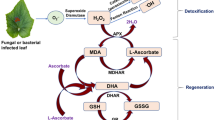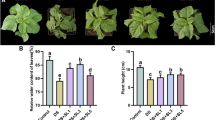Abstract
The study was conducted to evaluate the efficacy of salicylic acid foliar spray against Chilli Veinal Mottle Virus (ChiVMV) infecting Capsicum annuum L. which induces systemic acquired resistance. Different concentrations (50, 100, and 150 ppm) of salicylic acid were sprayed on pepper seedlings and were assessed for the levels of defense-related enzymes (POD, PPO, SOD, and catalase), photosynthetic pigments, total phenols, total proteins, and total carbohydrates, MDA for lipid peroxidation, and gene expression analysis of three defense-related marker genes. 100 ppm salicylic acid enhanced the defensive enzymes, phenols, and MDA levels and helped in mitigating their level gradually. It also aided in restoring the chlorophyll, carotenoids, total carbohydrates, and total protein level in the inoculated plants when compared to untreated inoculated and healthy plants. The mechanism associated with the plant resistance was confirmed by evaluating PAL, NPR1, and JAZ3 gene expression, which were up-regulated depicting the salicylic acid-induced systemic acquired resistance and jasmonic acid-mediated pathways. Hence, proving that salicylic acid is an effective resistance inducer in pepper plants against ChiVMV.







Similar content being viewed by others
References
Ali EA, Mahmoud AM (2013) Effect of foliar spray by different salicylic acid and zinc concentrations on seed yield and yield components of mungbean in sandy soil. Asian J Crop Sci 5:33–40. https://doi.org/10.3923/AJCS.2013.33.40
Anindya R, Joseph J, Gowri TDS, Savithri HS (2004) Complete genomic sequence of pepper vein banding virus (PVBV): a distinct member of the genus potyvirus, brief report. Arch Virol 149:625–632. https://doi.org/10.1007/s00705-003-0236-0
Bakr AA, Rezk HA, Saleh SM, El-Morshedy NH (2020) Significance of foliar sprayed salicylic acid in kidney bean resistance against tetranychus urticae (trombidiformes: tetranychidae) attack. Persian J Acarol 9:193–205. https://doi.org/10.22073/pja.v9i2.59408
Bawa G, Feng L, Yan L et al (2019) Pre-treatment of salicylic acid enhances resistance of soybean seedlings to Fusarium solani. Plant Mol Biol 101:315–323. https://doi.org/10.1007/s11103-019-00906-x
Beauverie J (1901) Essais d’immunisation des végétaux contre les maladies cryptogamiques. C R Acad Sci Ser III 133:107–110
Chander SM (1990) Enzymic associations with resistance to rust and powdery mildew in peas. Indian J Hortic 47:341–345
Conrath U (2006) Systemic acquired resistance. Plant Signal Behav 1:179–184. https://doi.org/10.4161/PSB.1.4.3221
Devi B, Singh G, Dash AK, Gupta SK (2020) Chemically induced systemic acquired resistance in the inhibition of french bean rust. Curr Plant Biol 23:100151. https://doi.org/10.1016/J.CPB.2020.100151
Dhopte AM, Munoz ML (1989) Useful techniques for plant scientists. Forum Plant Physiologists
Ding P, Ding Y (2020) Stories of salicylic acid: a plant defense hormone. Trends Plant Sci 25:549–565. https://doi.org/10.1016/J.TPLANTS.2020.01.004
Ding M, Yang C, Zhang L et al (2011) Occurrence of Chilli veinal mottle virus in Nicotiana tabacum in Yunnan, China. Plant Dis 95:357. https://doi.org/10.1094/PDIS-09-10-0686
Draper HH, Hadley M (1990) Malondialdehyde determination as index of lipid peroxidation. Methods Enzymol 186:421–431. https://doi.org/10.1016/0076-6879(90)86135-I
Du Z, Bramlage WJ (1994) Superoxide dismutase activities in senescing apple fruit (malus domestica borkh). J Food Sci 59:581–584. https://doi.org/10.1111/J.1365-2621.1994.TB05567.X
Han Y, Luo Y, Qin S et al (2014) Induction of systemic resistance against tobacco mosaic virus by ningnanmycin in tobacco. Pestic Biochem Physiol 111:14–18. https://doi.org/10.1016/J.PESTBP.2014.04.008
Haytova D (2013) A review of foliar fertilization of some vegetables crops. Annu Res Rev Biol 3:455–465
Hedge JE, Hofreiter BT (1962) Carbohydrate Chemistry. Academic Press, New York
Huseynova IM, Mirzayeva SM, Sultanova NF et al (2017) Virus-induced changes in photosynthetic parameters and peroxidase isoenzyme contents in tomato (Solanum lycopersicum L.) plants. Photosynthetica 56:841–850. https://doi.org/10.1007/S11099-017-0737-9
Ibrahim A, Abdel-Razzak H, Wahb-Allah M et al (2019) Improvement in growth, yield, and fruit quality of three red sweet pepper cultivars by foliar application of humic and salicylic acids. Horttechnology 29:170–178. https://doi.org/10.21273/HORTTECH04263-18
Kalimuthu K, Arivalagan J, Mohan M et al (2022) Point of care diagnosis of plant virus: current trends and prospects. Mol Cell Probes 61:101779. https://doi.org/10.1016/J.MCP.2021.101779
Kenyon L, Kumar S, Tsai WS, Hughes JA (2014) Virus diseases of peppers (Capsicum spp.) and their control. Adv Virus Res 90:297–354. https://doi.org/10.1016/B978-0-12-801246-8.00006-8
Lee JG, Yi G, Seo J et al (2020) Jasmonic acid and ERF family genes are involved in chilling sensitivity and seed browning of pepper fruit after harvest. Sci Rep 10:1–13. https://doi.org/10.1038/s41598-020-75055-z
Li T, Huang Y, Xu ZS et al (2019) Salicylic acid-induced differential resistance to the tomato yellow leaf curl virus among resistant and susceptible tomato cultivars. BMC Plant Biol 19:1–14. https://doi.org/10.1186/S12870-019-1784-0/TABLES/2
Lichtenthaler HK (1987) Chlorophylls and carotenoids: pigments of photosynthetic biomembranes. Methods Enzymol 148:350–382. https://doi.org/10.1016/0076-6879(87)48036-1
Masia A (1998) Superoxide dismutase and catalase activities in apple fruit during ripening and post-harvest and with special reference to ethylene. Physiol Plant 104:668–672. https://doi.org/10.1034/J.1399-3054.1998.1040421.X
Nafees M, Hussain R, Ahmad I et al (2019) Role of foliar application of salicylic acid and cultivars in chilli (Capsicum frutescens L.) production in arid region of Bahawalpur. J Hortic Sci Technol. https://doi.org/10.46653/JHST190201005
Nanda AK, Andrio E, Marino D et al (2010) Reactive oxygen species during plant-microorganism early interactions. J Integr Plant Biol 52:195–204. https://doi.org/10.1111/J.1744-7909.2010.00933.X
Naseer H, Shaukat K, Zahra N et al (2022) Appraisal of foliar spray of iron and salicylic acid under artificial magnetism on morpho-physiological attributes of pea (Pisum sativum L.) plants. PLoS One 17:1–25. https://doi.org/10.1371/JOURNAL.PONE.0265654
Ong CA, Varghese G, Ting WP (1980) The effect of chilli veinal mottle virus on yield of chilli (Capsicum annuum L.) MARDI. Res Bullet 8:74–78
Pavithra BS, Reddy KM et al (2020) Identification of resistant sources in chilli (Capsicum sp.) genotypes to groundnut bud necrosis virus (GBNV). Australas Plant Pathol 49:15–23. https://doi.org/10.1007/S13313-019-00672-W
Rajamanickam S, Nakkeeran S (2020) Flagellin of Bacillus amyloliquefaciens works as a resistance inducer against groundnut bud necrosis virus in chilli (Capsicum annuum L.). Arch Virol 165:1585–1597. https://doi.org/10.1007/S00705-020-04645-Z
Rao S, Chen X, Qiu S et al (2020) Identification of two new isolates of chilli veinal mottle virus from different regions in China: molecular diversity, phylogenetic and recombination analysis. Front Microbiol 11:3307. https://doi.org/10.3389/FMICB.2020.616171/BIBTEX
Ray J (1901) Les maladies cryptogamiques des végétaux. Rev Gen Bot 13:145–151
Riaz T, Ashfaq M, Khan Z (2021) Evaluation of the chilli veinal mottle virus CP gene expressing transgenic Nicotiana benthamiana plants for disease resistance against the virus. Braz J Biol 82:1–11. https://doi.org/10.1590/1519-6984.243692
Sahni S, Prasad BD (2021) Salicylic acid-induced resistance against mungbean yellow mosaic virus (MYMV) and enhanced seed yield in resistant and susceptible urdbean [Vigna mungo (L.) heper] genotypes. Legume Res—Int J 45:97–103. https://doi.org/10.18805/LR-4657
Sahu GK (2013) Salicylic acid: role in plant physiology and stress tolerance. Mol Stress Physiol Plant. https://doi.org/10.1007/978-81-322-0807-5_9
Selvaraj Y, Kumar R (1994) Enzymatic regulation in ripening mango fruit. Indian J Hortic 51:316–323
Shah HW, Zulfikar S, Bhutto A et al (2008) Transmission and host range studies of Pakistani isolate of Chilli Veinal Mottle Virus. Pak J Bot 40:2669–2681
Shivashankar KS, Geetha GA, Ravishankar KV et al (2022) Temperature gradient storage induced biochemical and molecular changes in mango (Mangifera indica L. cv. Alphonso) fruits. Acta Physiol Plant 44:3–9. https://doi.org/10.1007/S11738-022-03380-Z
Singh AK, Kushwaha N, Chakraborty S (2016) Synergistic interaction among begomoviruses leads to the suppression of host defense-related gene expression and breakdown of resistance in chilli. Appl Microbiol Biotechnol 100:4035–4049. https://doi.org/10.1007/S00253-015-7279-5
Singleton VL, Rossi JA (1965) Colorimetry of total phenolics with phosphomolybdic-phosphotungstic acid reagents. Am J Enol Viticulture 16:144–158
Thakur M, Sohal BS, Sandhu PS (2014) Effect of salicylic acid and benzothiaodiazole on antioxidative enzymes and phenolic contents in Indian mustard (Brassica juncea) and rapeseed (B. napus). Appl Biol Res 16:1. https://doi.org/10.5958/0974-4517.2014.00041.x
Tsai WS, Huang YC, Zhang DY et al (2008) Molecular characterization of the CP gene and 3′UTR of Chilli veinal mottle virus from South and Southeast Asia. Plant Pathol 57:408–416. https://doi.org/10.1111/J.1365-3059.2007.01780.X
Vlot AC, Dempsey DA, Klessig DF (2009) Salicylic acid, a multifaceted hormone to combat disease. Annu Rev Phytopathol 47:177–206. https://doi.org/10.1146/ANNUREV.PHYTO.050908.135202
Yousif DYM (2018) Effects sprayed solution of salicylic acid to prevent of wilt disease caused by Fussarium oxysporium. J Phys Conf Series Instit Phys Publ. https://doi.org/10.1088/1742-6596/1003/1/012001
Yu Y, Gui Y, Li Z et al (2022) Citation: induced systemic resistance for improving plant immunity by beneficial microbes. MDPI Plants 389:1–19. https://doi.org/10.3390/plants11030386
Acknowledgments
The authors are grateful to the Director, ICAR-Indian Institute of Horticultural Research, Bengaluru for providing the research facilities and support. The research was financially supported by the project on the “Consortium platform on Vaccines and diagnostics”, the Indian Council of Agricultural Research, Government of India, New Delhi, India.
Author information
Authors and Affiliations
Contributions
SS designed the work, performed the laboratory work, validated the results, and wrote the manuscript. GAG contributed to the interpretation of the results. KSS supervised the biochemistry work and provided the lab facilities. MKR provided the resources, supervised the work, revised the paper, and approved the final version of the article.
Corresponding authors
Ethics declarations
Conflict of interest
The authors have no competing interests to declare relevant to this article’s content.
Additional information
Publisher’s Note
Springer Nature remains neutral with regard to jurisdictional claims in published maps and institutional affiliations.
Rights and permissions
Springer Nature or its licensor holds exclusive rights to this article under a publishing agreement with the author(s) or other rightsholder(s); author self-archiving of the accepted manuscript version of this article is solely governed by the terms of such publishing agreement and applicable law.
About this article
Cite this article
Subhash, S., Geetha, G.A., Shivashankar, K.S. et al. Pepper-acquired resistance induced by salicylic acid against Chilli Veinal Mottle Virus. Indian Phytopathology 75, 1159–1166 (2022). https://doi.org/10.1007/s42360-022-00561-1
Received:
Revised:
Accepted:
Published:
Issue Date:
DOI: https://doi.org/10.1007/s42360-022-00561-1




